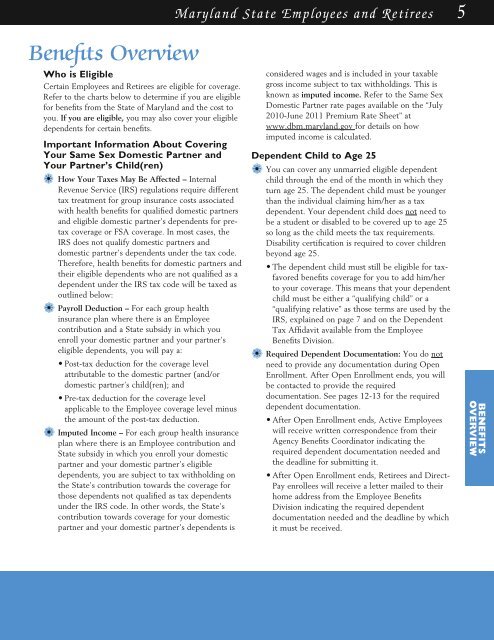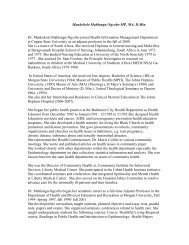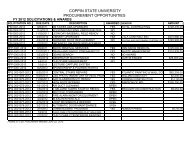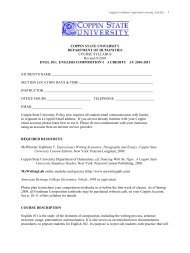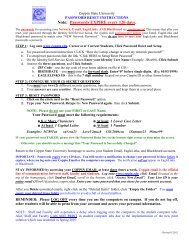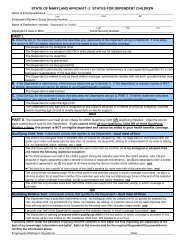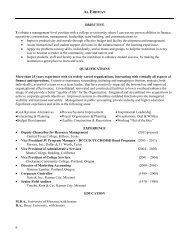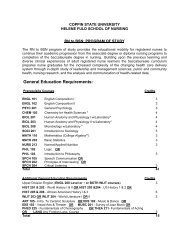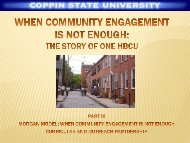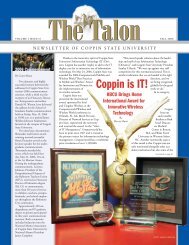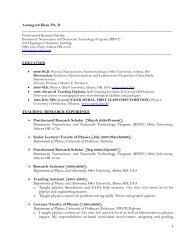FY2011 Health Benefits Booklet
FY2011 Health Benefits Booklet
FY2011 Health Benefits Booklet
You also want an ePaper? Increase the reach of your titles
YUMPU automatically turns print PDFs into web optimized ePapers that Google loves.
Maryland State Employees and Retirees 5<br />
<strong>Benefits</strong> Overview<br />
Who is Eligible<br />
Certain Employees and Retirees are eligible for coverage.<br />
Refer to the charts below to determine if you are eligible<br />
for benefits from the State of Maryland and the cost to<br />
you. If you are eligible, you may also cover your eligible<br />
dependents for certain benefits.<br />
Important Information About Covering<br />
Your Same Sex Domestic Partner and<br />
Your Partner’s Child(ren)<br />
a• How Your Taxes May Be Affected – Internal<br />
Revenue Service (IRS) regulations require different<br />
tax treatment for group insurance costs associated<br />
with health benefits for qualified domestic partners<br />
and eligible domestic partner’s dependents for pretax<br />
coverage or FSA coverage. In most cases, the<br />
IRS does not qualify domestic partners and<br />
domestic partner’s dependents under the tax code.<br />
Therefore, health benefits for domestic partners and<br />
their eligible dependents who are not qualified as a<br />
dependent under the IRS tax code will be taxed as<br />
outlined below:<br />
a• Payroll Deduction – For each group health<br />
insurance plan where there is an Employee<br />
contribution and a State subsidy in which you<br />
enroll your domestic partner and your partner’s<br />
eligible dependents, you will pay a:<br />
• Post-tax deduction for the coverage level<br />
attributable to the domestic partner (and/or<br />
domestic partner’s child(ren); and<br />
• Pre-tax deduction for the coverage level<br />
applicable to the Employee coverage level minus<br />
the amount of the post-tax deduction.<br />
a• Imputed Income – For each group health insurance<br />
plan where there is an Employee contribution and<br />
State subsidy in which you enroll your domestic<br />
partner and your domestic partner’s eligible<br />
dependents, you are subject to tax withholding on<br />
the State’s contribution towards the coverage for<br />
those dependents not qualified as tax dependents<br />
under the IRS code. In other words, the State’s<br />
contribution towards coverage for your domestic<br />
partner and your domestic partner’s dependents is<br />
considered wages and is included in your taxable<br />
gross income subject to tax withholdings. This is<br />
known as imputed income. Refer to the Same Sex<br />
Domestic Partner rate pages available on the “July<br />
2010-June 2011 Premium Rate Sheet” at<br />
www.dbm.maryland.gov for details on how<br />
imputed income is calculated.<br />
Dependent Child to Age 25<br />
a• You can cover any unmarried eligible dependent<br />
child through the end of the month in which they<br />
turn age 25. The dependent child must be younger<br />
than the individual claiming him/her as a tax<br />
dependent. Your dependent child does not need to<br />
be a student or disabled to be covered up to age 25<br />
so long as the child meets the tax requirements.<br />
Disability certification is required to cover children<br />
beyond age 25.<br />
• The dependent child must still be eligible for taxfavored<br />
benefits coverage for you to add him/her<br />
to your coverage. This means that your dependent<br />
child must be either a “qualifying child” or a<br />
“qualifying relative” as those terms are used by the<br />
IRS, explained on page 7 and on the Dependent<br />
Tax Affidavit available from the Employee<br />
<strong>Benefits</strong> Division.<br />
a• Required Dependent Documentation: You do not<br />
need to provide any documentation during Open<br />
Enrollment. After Open Enrollment ends, you will<br />
be contacted to provide the required<br />
documentation. See pages 12-13 for the required<br />
dependent documentation.<br />
• After Open Enrollment ends, Active Employees<br />
will receive written correspondence from their<br />
Agency <strong>Benefits</strong> Coordinator indicating the<br />
required dependent documentation needed and<br />
the deadline for submitting it.<br />
• After Open Enrollment ends, Retirees and Direct-<br />
Pay enrollees will receive a letter mailed to their<br />
home address from the Employee <strong>Benefits</strong><br />
Division indicating the required dependent<br />
documentation needed and the deadline by which<br />
it must be received.<br />
BENEFITS<br />
OVERVIEW


